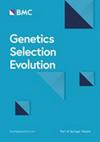全基因组序列恢复了斑嘴鸭(鸭属)的原始分类
IF 3.1
1区 农林科学
Q1 AGRICULTURE, DAIRY & ANIMAL SCIENCE
引用次数: 0
摘要
鸭属(Anas)是鸭类的一个属,包括相当多的物种,其中一些物种是家鸭的祖先。然而,鸭属在分类学上的地位仍不确定,因为最初根据形态特征将其归类为鸭属的几个物种后来被重新分类,并与南美洲的Tachyeres属归为一类,主要依据是对其线粒体基因序列的分析。在此,我们利用最近组装的九个 Anas 基因组、两个 Tachyeres 基因组和一个 Cairina 基因组构建了系统发生树。结果表明,在全基因组水平上,北方锹形目(Anas clypeata)和贝加尔凫(Anas formosa)与其他雉科物种聚类,而不是与斯泰默鸭(Tachyeres属)聚类。因此,我们建议恢复安氏鸭属的原始分类,其中包括北方锹形目和贝加尔凫目,共 47 种。此外,我们的研究还揭示了广泛的不完全世系分类以及从 Tachyeres 到 Anas 的古老引入事件,这导致了 Anas 基因组内显著的系统发育不一致。这一古老的引入事件不仅支持了 Anas 起源于南美洲的理论,而且在塑造 Anas(包括家鸭)的进化轨迹方面发挥了重要作用。本文章由计算机程序翻译,如有差异,请以英文原文为准。
Whole-genome sequences restore the original classification of dabbling ducks (genus Anas)
Anas, is a genus of dabbling ducks and encompasses a considerable number of species, among which some are the progenitors of domestic ducks. However, the taxonomic position of the Anas genus remains uncertain because several of its species, initially categorized as Anas based on morphological characteristics, were subsequently reclassified and grouped with the South American genus Tachyeres, primarily based on analysis of their mitochondrial gene sequences. Here, we constructed a phylogenetic tree using nine of our recently assembled Anas genomes, two Tachyeres genomes, and one Cairina genome that are publicly available. The results showed that the Northern shoveler (Anas clypeata) and Baikal teal (Anas formosa) clustered with the other Anas species at the whole-genome level rather than with the Steamer ducks (genus Tachyeres). Therefore, we propose to restore the original classification of the Anas genus, which includes the Northern shoveler and Baikal teal species, 47 species in total. Moreover, our study unveiled extensive incomplete lineage sorting and an ancient introgression event from Tachyeres to Anas, which has led to notable phylogenetic incongruence within the Anas genome. This ancient introgression event not only supports the theory that Anas originated in South America but also that it played a significant role in shaping the evolutionary trajectory of Anas, including the domestic duck.
求助全文
通过发布文献求助,成功后即可免费获取论文全文。
去求助
来源期刊

Genetics Selection Evolution
生物-奶制品与动物科学
CiteScore
6.50
自引率
9.80%
发文量
74
审稿时长
1 months
期刊介绍:
Genetics Selection Evolution invites basic, applied and methodological content that will aid the current understanding and the utilization of genetic variability in domestic animal species. Although the focus is on domestic animal species, research on other species is invited if it contributes to the understanding of the use of genetic variability in domestic animals. Genetics Selection Evolution publishes results from all levels of study, from the gene to the quantitative trait, from the individual to the population, the breed or the species. Contributions concerning both the biological approach, from molecular genetics to quantitative genetics, as well as the mathematical approach, from population genetics to statistics, are welcome. Specific areas of interest include but are not limited to: gene and QTL identification, mapping and characterization, analysis of new phenotypes, high-throughput SNP data analysis, functional genomics, cytogenetics, genetic diversity of populations and breeds, genetic evaluation, applied and experimental selection, genomic selection, selection efficiency, and statistical methodology for the genetic analysis of phenotypes with quantitative and mixed inheritance.
 求助内容:
求助内容: 应助结果提醒方式:
应助结果提醒方式:


